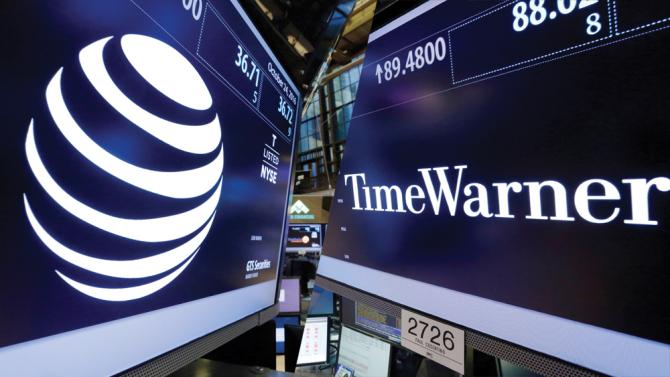AT&T and Time Warner are two telecommunications giants that are currently threatening capitalism and governmental checks are the only barrier to such peril. AT&T agreed to buy Time Warner on Oct. 22 for $85.4 billion to create a vertically merged company that would produce broadband subscriptions and satellite television connections. Both of the aforementioned services will be distributed to the new company’s wireless phone plan customers. Because AT&T and Time Warner are two of the few players in the telecommunication industry, they should not follow through with the merger.
Consolidated businesses create an oligopolistic environment with severely imbalanced power dynamics. Our fear with an oligopolistic environment, in which a few large players offer identical services, is that the market acts like a monopoly. With fewer competitors and the unique product of combined satellite T.V. and wireless phone plans, AT&T and Time Warner would have increased their market power. This would allow the companies to raise prices beyond what the price would have been if they had more competitors, and if the price was set where the supply and demand met one another.
Increased prices do indeed help those within the company, but it is unjust to irrationally over price products. It is unfair to the consumers, and it completely goes against the economic balance of profit maximization. Additionally, because there are enough competitors that offer alternative products, increased prices may decrease the number of consumers buying products for that company.
The merger also should not have happened because mergers only serve as models for other mergers. When other companies merge with one another, fellow companies may be incentivized to merge as well in order to prevent industry giants from dominating the market. This merger is indicative of that in particular because it emulates the 2009 Comcast and NBC Universal megadeal, where the two telecommunications giants also became one company and created another oligopolistic situation. The deal went through culminating with Comcast becoming the sole owner of NBC Universal by March 2013. That deal could serve as a model for the AT&T-Time Warner merger, further inundating the telecommunications industry with oligopolies and putting consumers at a disadvantage.
Likewise, Verizon and Yahoo, two other large media and telecommunications companies, are currently negotiating a deal where they may consolidate, further proving the point that mergers catalyze one another. This endless cycle could eventually lead to there being only a few companies in the telecommunications industry. This would only strengthen the oligopolistic market power of the companies and destroy the free market, which is what ultimately benefits consumers.
Despite all of the aforementioned reasons why the AT&T-Time Warner merger was a faulty decision, the government’s involvement in the situation should be also limited from expanding. The Sherman Act, the Clayton Act and the Federal Trade Commission Act, which all collectively form the United States’ antitrust policy, are already in action, preventing collusion and major monopolies that would perilously destroy the U.S.’s current capitalistic economy. Consequently, the government already has historical involvement in the situation, limiting the merged companies from becoming too powerful. Furthermore, the Department of Justice (DOJ) has yet to approve the merger in court, where the DOJ can decide whether or not to block a merger if it could potentially be a monopoly, cartel or trust. Therefore, the government already has heavily involved in the situation, and is effective in preventing collusion.
The current DOJ check is sufficient, especially since clearly exercise its right to block mergers as evidenced by its challenging of 44 of the 1429 proposed corporate mergers in 2012, according to the Federal Trade Commission. In fact, the DOJ previously blocked a similar merger, the proposed merger of AT&T and T-Mobile in 2011. As a result, the DOJ would unequivocally not have any qualms about blocking two other telecommunications companies, such as AT&T and Time Warner.
Too much governmental involvement in the economy prevents capitalism from pursuing its true form within a free economy, a foundation of the U.S. economy of the United States. Freedom to pursue one’s financial, social and political dreams is a foundation of the United States, and can only happen within a free economy, where mobility is possible and governmental involvement is limited.
Because the AT&T and Time Warner merger forms a monopolistic situation, it should not have happened. However, with the current governmental checks on monopolies, any American citizen can reasonably trust that this merger too will meet the same fate as the 2011 merger of AT&T and T-Mobile.




